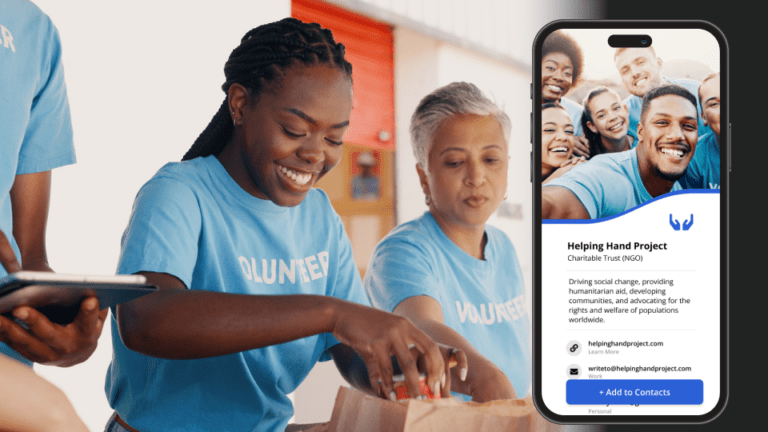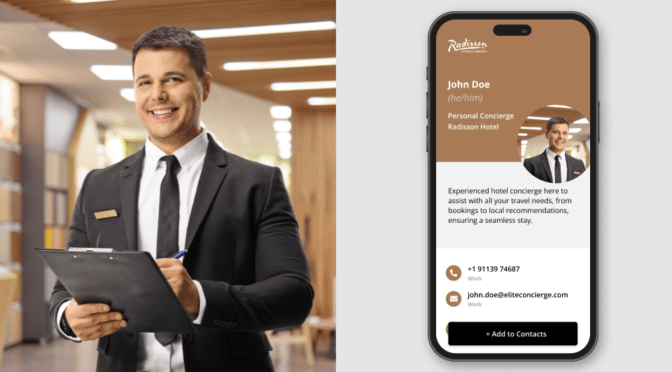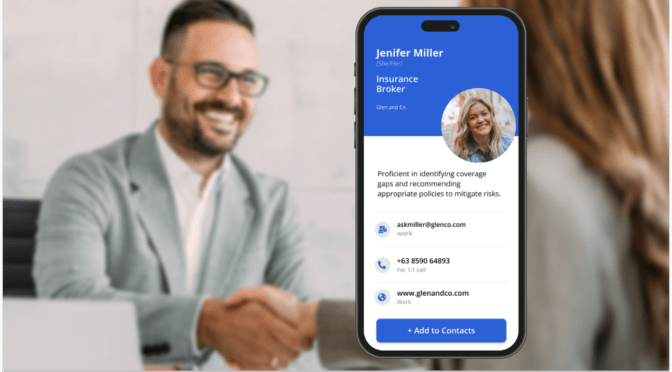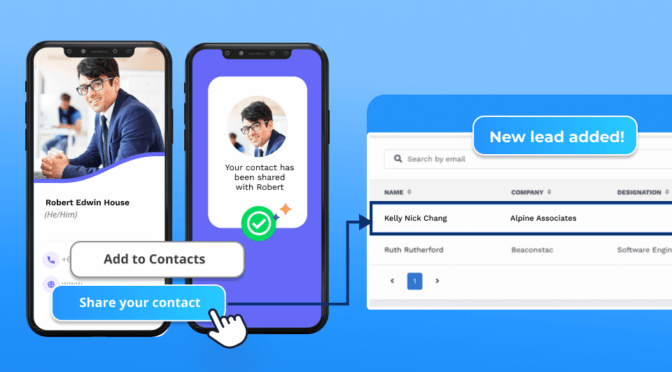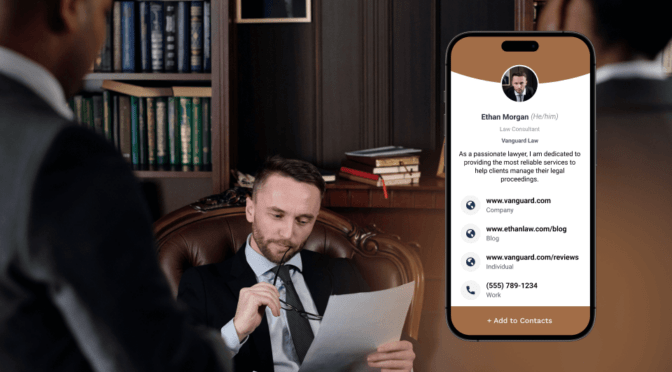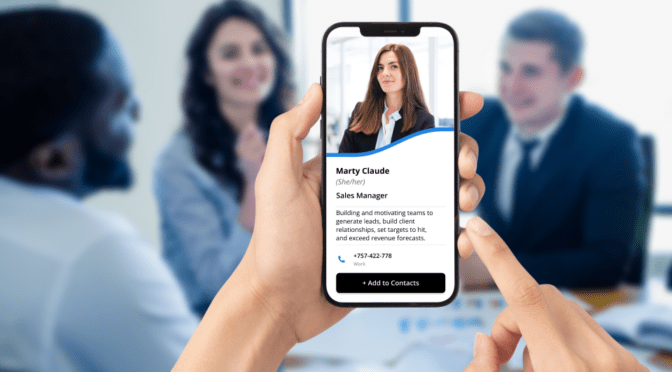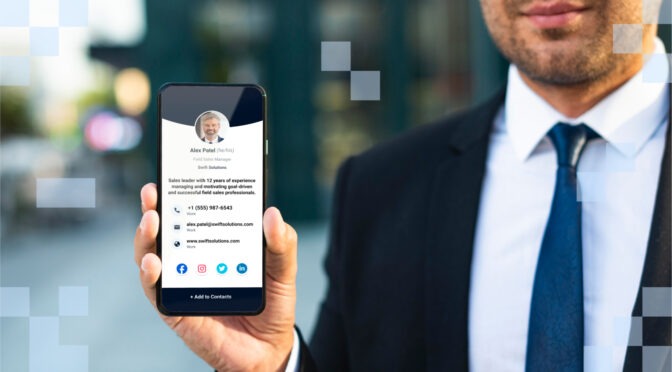Digital business cards can open up a world of opportunities for non-government organizations: lobbying and networking, launching volunteer recruitment drives, spreading the word about community campaigns, and much more. They’re easy to use, offer broader sharing possibilities, and drive results you can measure. Learn why NGOs should use e-contact cards to streamline operations. We’ll also cover five high-impact use cases to use these cards effectively. Let’s break it down.
Table of contents
- How NGOs can benefit from digital business cards
- 5 Ways NGOs can use digital business cards
- Design digital business cards for your representatives
- Frequently asked questions
Before you proceed: how digital business cards work for NGOs
In 2023, roughly 46% of NGOs reported rising operational expenses (networking, event and campaign management, etc.) as their biggest challenge.
The only issue is that NGO reps have to network frequently. That means handing out printed cards at events will add to significant collateral costs, such as replenishing them for a fresh batch now and then. A digital business card is the most straightforward solution here. Here’s why:
1. Create once, and use forever
NGOs want to use every resource strategically. That’s where traditional business cards create a concern. You must reprint your business cards and distribute them again, even for a minor change.
A digital card saves you from this hassle. You can design and create a digital business card anytime, anywhere, in a few clicks! Even better, you can modify any detail or add new insights anytime. All your shared cards will be automatically updated.
✅ How to get started
- Start by creating a card from scratch and include all the relevant details you want to pass on to others.
- Save this card as a QR Code, a link, or a wallet pass to share your details whenever the opportunity arises—whether at an event or a meeting.
Try new templates: Choose from five stunning new digital business card templates and create your first digital business card

2. Share more details in more ways
Digital business cards empower you to share your NGO’s mission and spotlight your work on a global stage. The ease of sharing your digital cards through WhatsApp, email, or social media channels helps increase your card’s reach, thanks to widespread digital adoption. For instance, if you reach volunteers via WhatsApp groups, a digital business card link is all it will take to kick-start networking.

If you use a digital business card platform like Uniqode (👋 that’s us), you can even share these cards as Apple Wallet or Google Wallet passes. And if you want to target people beyond your domestic borders, there’s multi-language support.
✅ How to get started
- Customize your e-contact cards to match the look and feel of your NGO: play with colors, add logo, fonts, and other visual elements.
- Share your mission details and focus on any specific campaign or event. For example:
- Links to upcoming fundraising events
- Volunteer registration forms
- Donation campaigns
- And more
3. Take an eco-friendly approach
E-business cards help you cut (not just limit) back on unnecessary resources and paper use.
Research from the World Economic Forum states the importance of digital technologies in reducing carbon footprint and achieving energy efficiency. So, when replacing paper cards with digital ones, you choose a sustainable networking path. This eco-friendly, pro-social, and environmental approach can boost your NGO’s reputation when your partners, donors, and volunteers learn about your sustainable efforts. It also lets people know you value their time and resources enough to facilitate easy access.
✅ How to get started
- Be vocal about your cause, including the reason for using digital business cards
- Share your digital card with participants and highlight your NGO’s core values to use technology for sustainability advocacy
4. Eliminate procurement worries
With traditional cards, you have to worry about vendor sourcing, procurement, and distribution. There’s also the risk of printed batches not sticking to the desired design template.
In contrast, you can customize and modify virtual business cards from your mobile device or desktop. You can also create these cards in bulk and instantly distribute them across your entire team without waiting too long to print new cards.
✅ How to get started
- Use the bulk-creation feature on a digital business card platform like Uniqode to generate up to 2,000 cards within five minutes.
- Upload a database with details of your team members and design customized cards for each member in a couple of clicks.
5. Save card-printing dollars
You’d be surprised that the average cost of designing and printing a stack of paper business cards is approximately $194 per person. You must pay a graphic designer, work with a printing store, and coordinate with a logistics company to get the physical cards.
Using digital business cards, you can save all this money (and hassle). Creating, customizing, and sharing your business cards is as easy as dragging and dropping elements—without breaking the bank.
✅ How to get started
- Pilot digital business cards for your team members, starting with a select few and gradually expanding to the entire team.
- Creating digital business cards for 10 team members costs only $50 annually.
- Convert other paper-based resources such as pamphlets, flyers, and postcards into QR Codes for paperless sharing.

Digital business cards for NGO: 5 use cases to explore
From managing community outreach to facilitating volunteer recruitment, digital business cards can do much for an NGO.
We’ve discovered five ways for NGOs to use virtual cards and strategically level their operations:
- Boost chances of securing funds
- Launch and manage community outreach
- Discover multinational partnership opportunities
- Conduct snap volunteer recruitment drives
- Dispatch quicker emergency response campaigns

1. Boost chances of securing funds
Fundraising events and conferences are the bread and butter for NGOs. However, a 2024 report states that securing funding is among the most common challenges NGOs face today. Here are some reasons why NGOs struggle to raise funds, per the study:
❌ No dedicated or specialized team to prepare for fundraising events
❌ Lack of awareness in the community about their services and impact
❌ Limited or no resources to launch marketing campaigns and promote the organization
Digital business cards offer NGOs a cost-effective way to tackle many challenges on a limited budget. Let’s break down how you can strengthen your fundraising efforts with these e-contact cards:
✅ Nail the first impression: Share a digital business card to give potential donors a complete view of your work, even if you have just a few seconds to interact with them. Add clickable links to your mission statement, impactful stories, reports, and other essential assets.
✅ Do effective follow-ups: With limited team bandwidth, keeping track of all stakeholders and following up with them can be challenging, leading to less awareness. Digital business cards can act as virtual relationship managers, capturing recipients’ information through Two-Way Contact Sharing. These details are saved in a database for seamless follow-ups.
✅ Target for promotions: Your digital business card can hold multiple links. You can showcase your impact and positively influence stakeholders by sharing your social media profiles. This will passively promote your NGO works without becoming a pushy marketing campaign. You can even retarget recipients on social media. Check out this example to see how this would play out in a practical scenario. This digital business card has a clear CTA to help with an ongoing campaign. There’s even a direct donation link to contribute to the organization’s fund. You can always rearrange the flow of details per your preference.

2. Launch and manage community outreach
Digital business cards for NGOs aren’t just meant for networking or exchanging contact details. They also help drive public engagement through awareness campaigns, public meetings, and street shows—essentially from wherever you use them.
For example, if you’ve recently launched a drug awareness campaign, you could include card links to:
- Dedicated helplines for at-risk individuals
- Resources for dealing with addiction withdrawal
- Healthy and safety guidelines for family members and loved ones
- Tips on identifying common signs and symptoms of substance abuse
It’s all about designing your card to fit the context of your organizational or campaign efforts.
Once you have community involvement, you can redirect partners to other projects. This wouldn’t require anything other than sharing another card explicitly designed for that purpose.
For example, if you’re redirecting resources from a “water conservation project” to a “food drive,” you can create a new version by changing the “bio” section to talk about the objectives of this program. Include relevant links to the concerned program, if necessary.
These digital business cards can help you acknowledge and appreciate your most frequent donors by linking a page with their profiles.
The best part? You can easily track the success of your outreach programs by measuring KPIs such as the number of people reached, website visits from a channel (business card), number of donors, and more.
💡Pro Tip: Use digital business cards as handouts during networking, and monitor the impact of your outreach later. Measure the performance through card analytics on the Uniqode dashboard. You can create and track multiple cards for different campaigns for a bird’s-eye view of their impact.

- You can monitor data such as (but not limited to):
- Number of card scans: indicating reach during an event
- Number of contacts saved: indicating interest for future engagement
- Card view and unique users: indicating campaign potential
- Card views by time: revealing active hours for most engagement
- Card views by city: for best-performing geography in multi-city outreaches
3. Discover multinational partnership opportunities
For an NGO to thrive, it must look beyond domestic territories and organizations. You have to focus on establishing global reach. However, language barriers can limit your networking efforts.
Imagine attending an event in Sweden and handing out paper business cards written in Spanish. Recipients will struggle to read the text and likely pay more attention to cards in Swedish or English. People will pay more attention to the content written in their language, even if they know a second language.
You can create digital business cards in multiple languages. Enabling multi-language support on Uniqode will let you upload your card details in your preferred language. When shared, recipients can choose their preferred language to view the card.

That said, when creating multi-language cards, you should:
- Include contextual information that appeals to the donors/partners you’re pitching to
- Incorporate links to translated versions of the resources you usually direct to
- Highlight your ongoing efforts and campaigns in specific regions
You have to highlight what you’ve already been doing without their help and hint at what you can achieve with their contributions.
4. Conduct snap volunteer recruitment drives
A 2023 survey revealed that nearly 50% of NGOs face problems in recruiting and retaining volunteers.
Part of this is due to the very nature of volunteering. People work for a designated period, either out of social responsibility or to gain more experience, and then move on.
That’s another area where NGOs can use digital business cards to eliminate the struggle of finding and managing volunteers.
For example, let’s say you’re at a networking event or even delivering a keynote address at a school or college.
You can quickly create a digital business card for this specific event. If you find an opportunity to recruit more members to your volunteering program, share your card with them as a QR Code from a poster, banner, postcard, etc.
Remember to add these details to your business cards:
- Links to your “Resources” page: Highlight recent campaigns, charity drives, or ongoing projects. In short, let potential volunteers know about the kind of work experience you offer. This will build context and familiarize candidates with your work.
- Links to registration forms: Create a dedicated section for volunteers to sign up for the program. You can include fields to capture critical contact details and provide insight into the responsibilities.
Additionally, consider enabling two-way contact sharing to collect candidates’ details when sharing your business cards. This can streamline your recruitment process with a quick exchange of information.
5. Dispatch quicker emergency response campaigns
One of the most common challenges in launching emergency response or relief campaigns is quickly involving donors and partners.
If you use a digital business card for outreach, you can rely on your digital address book to call for volunteers in times of crisis. If you use Uniqode, simply enabling the “Lead Collection” functionality when creating your cards will kickstart your digital address book.
Think of this address book as a repository of all your contacts collected in real-time through your e-business cards. It includes details such as email IDs, phone numbers, company websites, and location—everything that can help you communicate faster with your associates.

Use these details to reach local partners who can immediately respond to an incident. For instance, you could contact high-profile donors to request financial aid for the effort.
Beyond that, when creating digital business cards for NGOs, include a field for recipients to list their place of residence/work. This will add an extra filter to segment leads and allow you to identify those closest to an incident quickly.
🔥 Pro tip: Send personalized outreach messages at scale and maximize the turnout for emergency response campaigns. Integrate digital business cards with your preferred CRM and send emails or text messages to spread the word about urgent campaigns.

Design digital business cards for your representatives today
Building partnerships, securing funds, and finding volunteers are some of the biggest challenges for non-governmental organizations.
Digital business cards for NGOs can help you address these challenges systematically. You can use these e-cards to share your organization’s mission with the world and bring more attention to the impact you’ve created.
With Uniqode, it gets even more accessible. You can effortlessly create cards in bulk without any technical skills. With real-time lead capture and a dedicated contact repository, you can also streamline your networking and lobbying for your organization. Try it out for free today with our 14-day no-commitment trial!
Frequently asked questions
1. How do I create a digital business card?
Sign up for a free trial on Uniqode. Once logged in, you’ll see the ‘+Create‘ tab on the top right of your dashboard. From there, you can choose from different card templates or customize the included fields and details as you see fit.
2. What is the best way to keep track of business cards?
If you have a Uniqode account, click the “Digital Business Cards” option on the left-hand side of your dashboard. From there, you can select “My Cards” or “Organization Cards” to view and edit all your saved cards up until now.
If you wish to track card engagement, select “Analytics” from the left-hand side of the dashboard. You’ll get detailed insight into card views, saved contacts, unique users, and more.
3. How do I distribute my digital business card?
For potential donors and partners, you can share your digital contact card through a URL or a QR Code. Uniqode also lets you create Apple or Google Wallet Passes if you need additional ways to exchange contact information digitally.







